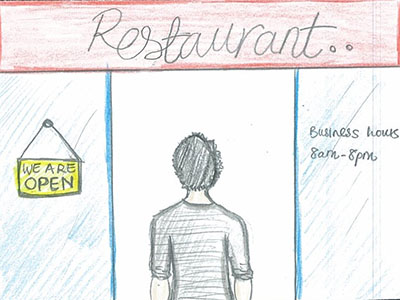“May I offer any recommendations on the menu?” the waiter asks cheerfully. “No,” the guest answers, ”We already knew what we wanted before we sat down.” That’s strange, the waiter thought, I haven’t even told them about the specials and they’ve already decided?
Without skipping a beat, the table proceeds to order the most talked-about dishes on the menu. It’s obvious to the waiter that they must’ve scoured the Internet in the days leading up to their reservation to prepare in advance. Even after hearing the specials, they were unwilling to veer from the script. “Everything sounds really good but we’ve just heard so much about the [appetizer] and the [entree] that we have to try them,” they say proudly, returning the menus.
Technology has drastically changed the way people make decisions in restaurants and has caused table-side negotiations to become more anti-social. Waiters approach tables to offer guidance and routinely find everyone on their phones swiping through photographs of popular dishes. Instead of asking about specific menu items, some guests unapologetically show the photos to the server and ask him to identify it.
The “Show-and-Tell” method has become a very common way for restaurant guests to solicit help navigating the menu from their servers. These guests only care about the most photogenic dishes that look good on their Instagram. Some guests don’t interact at all. They forgo help because they’ve already invested time beforehand researching fan favorites and critically-acclaimed dishes. They willfully trust the opinions of total strangers over the staff’s expertise.

The “storyboarding” of restaurant meals is a poisonous trend that turns potential great restaurant experiences into pedestrian ones. More diners are planning their meals in advance like film directors who have a particular vision of how their films should look aesthetically. But dining this way negates impromptu decisions that might stray from the original plan but improve someone’s meal. Often the storyline they’ve scripted ahead of time is static instead of the dynamic experience they would have had if they’d approached dining more openly.
A restaurant visit is meant to be a spontaneous experience. One of the joys of great restaurants is their ability to surprise you unexpectedly. That can’t happen with so much advance planning. Everyone can recall thanking a waiter for a suggestion that changed the course of their meal. One could argue that as restaurants have become more expensive—the cost of bad choices has gone up too—so preparing in advance is a preemptive measure that can help curtail disappointment. Unfortunately, safer choices don’t always mean better ones.
Putting so much faith in other people’s opinions will often lead individuals to make poorer choices for themselves. Ordering based on popularity—instead of one’s own personal preferences—sets these guests up for failure. Just because everyone raves about a particular dish, doesn’t mean that it’s the right dish for everyone. Chefs work very hard on every dish they put on the menu, and it drives them batty when guests only gravitate toward the “signature” dishes.
Negative reviews on sites like Yelp and Trip Advisor, aside from grumbling about prices, often condemn signature dishes as being “not worth the hype.” In most cases, these diners were let down because they ordered popular items instead of approaching their meal with a blank slate. Groupthink makes diners less adventurous and their choices more monochromatic. Servers are now tasked with trying to force guests into conversation about the menu when it used to be the other way around.
Luckily, it’s very easy to correct these bad habits. There are simple steps you can take to avoid the pitfalls of storyboarding. First, read as little as possible about a restaurant beforehand so you don’t arrive with too many preconceived notions. Engage the staff and ask about “sleeper hits” not just the “blockbusters.” Be more open to suggestions and willing to take risks with your order. Step out of your comfort zone. Instead of everyone at the table ordering the same famous dish, try to diversify your menu choices by including that dish among a variety of other shared plates. Approach dining out with the understanding that pleasant surprises can’t happen without the possibility of disappointment. It’s always worth chancing because restaurant experiences can only be great if you let them.




